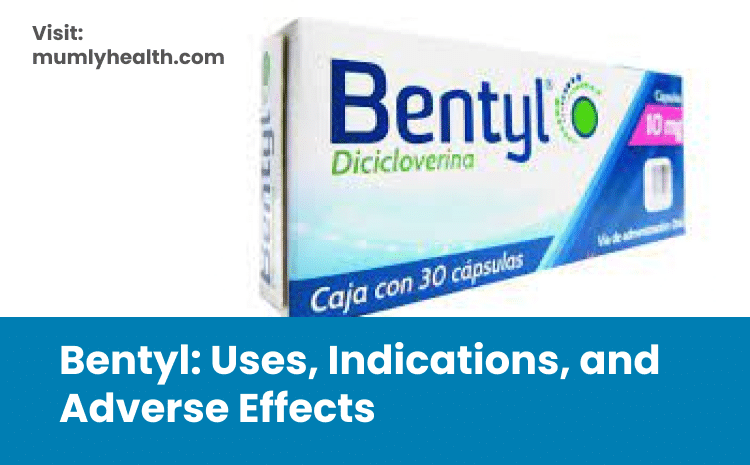BENTYL functions as both an antispasmodic and an anticholinergic (antimuscarinic) agent and is accessible in the subsequent form. BENTYL injection is a sterile aqueous solution, devoid of pyrogens, intended for intramuscular administration (NOT SUITABLE FOR INTRAVENOUS USAGE). It is supplied in an ampoule containing 20 mg/2 mL (10 mg/mL) dicyclomine hydrochloride USP dissolved in sterile water for injection, rendered isotonic with sodium chloride.
Chemical Structure: BENTYL, known chemically as dicyclomine hydrochloride, is represented by the subsequent molecular structure: [Bicyclohexyl]-1-carboxylic acid, 2-(diethylamino) ethyl ester, hydrochloride, with the molecular formula C19H35NO2•HCl.
Its molecular weight is 345.95. Dicyclomine hydrochloride materializes as a fine, white, crystalline powder, essentially lacking any discernible odour and exhibiting a bitter flavour. It possesses solubility in water, higher solubility in alcohol and chloroform, and a very limited solubility in ether.
How Long Does Bentyl Stay in Your System?
The duration that Bentyl (dicyclomine) remains in your system can vary based on factors such as your individual metabolism, dosage, frequency of use, and overall health. Generally, the half-life of Bentyl, which is the time it takes for half of the drug to be eliminated from the body, is around 1 to 2 hours.
However, it’s important to note that the effects of the medication might not directly correlate with its presence in the bloodstream. The therapeutic effects of Bentyl might last longer than the time it takes for the drug to be eliminated from the body, due to its mechanism of action and potential interactions with receptors and tissues.
If you’re concerned about how long Bentyl might affect you or have questions about its presence in your system, it’s advisable to consult a healthcare professional who can provide personalized information based on your specific situation.
Usage Indications:
BENTYL® (dicyclomine hydrochloride) is prescribed to address functional bowel/irritable bowel syndrome in patients.
Dosage and Application:
Dosage should be individualized to match each patient’s requirements.
Intramuscular Dosage and Application in Adults:
BENTYL Intramuscular Injection must exclusively be administered through intramuscular means and should not be administered by any other method.
The suggested intramuscular dose ranges from 10 mg to 20 mg, taken four times daily. The use of intramuscular injection should be confined to 1 or 2 days, typically when oral medication is not feasible. Intramuscular injection exhibits approximately double the bioavailability of oral forms.
Preparation for Intramuscular Administration:
Parenteral drug products should be visually inspected for any particles or discolouration prior to administration, whenever the solution and container allow. Before injecting, it’s advisable to withdraw the syringe to prevent inadvertent intravascular injection, as thrombosis could occur if the drug is mistakenly injected intravascularly.
Presentation and Potency:
BENTYL injection is available in a strength of 20 mg/2 mL (10 mg/mL).
Storage and Handling:
BENTYL Injection is supplied in packs of five 20 mg/2 mL ampules (10 mg/mL). It is recommended to store it at room temperature, preferably below 86°F (30°C). Protection from freezing is essential.
Side Effects:
The pattern of unwanted effects associated with dicyclomine is primarily linked to its interactions with muscarinic receptors. These effects arise from the inhibitory impact on muscarinic receptors within the autonomic nervous system. Generally, these effects are proportional to the dosage and tend to reverse upon discontinuation of treatment.
Interactions with Other Medications:
BENTYL may interact with other medications, including antiglaucoma agents and drugs exhibiting anticholinergic activity. Caution should be exercised when combining BENTYL with these substances, and it may not be advisable in some cases.
Unintentional Intravenous Administration:
BENTYL solution is for intramuscular administration only. Do not administer by any other route. Inadvertent intravenous administration may result in thrombosis, thrombophlebitis, and injection site reactions such as pain, oedema, skin colour change, and reflex sympathetic dystrophy syndrome.
Read Also: Cefdinir for Tooth Infection | Side Effects, Precautions, Interactions
Cardiovascular Conditions:
Dicyclomine hydrochloride needs to be used with caution in conditions characterized by tachyarrhythmia, congestive heart failure, and cardiac surgery. Investigate any tachycardia before administration.
Peripheral And Central Nervous System:
Dicyclomine hydrochloride can have effects on the peripheral and central nervous system, including dryness of the mouth, blurred vision, dizziness, and more. Patients should be cautious when engaging in activities requiring mental alertness.
Myasthenia Gravis:
BENTYL should not be administered to patients with myasthenia gravis due to the potential for muscular weakness and paralysis.
Intestinal Conditions:
In cases of diarrhoea indicating incomplete intestinal obstruction, the use of BENTYL may be inappropriate and potentially harmful. Additionally, conditions like Ogilvie’s syndrome and toxic megacolon should be considered.
Prostatic Enlargement:
Care should be taken in patients with known or suspected prostatic enlargement, as such enlargement might lead to urinary retention.
Hepatic And Renal Impairment:
Caution is advised when using BENTYL in patients with known hepatic and renal impairment.
Elderly Population:
Elderly individuals might be more susceptible to adverse effects and should use dicyclomine hydrochloride with caution.
Pediatric Use:
The safety and effectiveness of BENTYL in pediatric patients have not been established. It is contraindicated in infants less than 6 months old.
Geriatric Use:
Caution is advised when dosing elderly patients due to the higher likelihood of decreased hepatic, renal, or cardiac function, as well as concurrent conditions or other medications.
Renal Impairment:
Patients with impaired renal function might be at greater risk of toxic reactions and should use BENTYL cautiously.
Hepatic Impairment:
Caution should be exercised when administering BENTYL to patients with hepatic impairment.
Please let me know if you’d like any specific sections paraphrased further or if you have any other requests.
